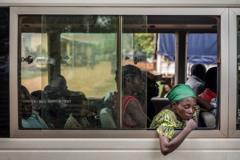The landscape of refugee resettlement to the United States is facing increasing scrutiny as policies shift under the Trump administration. While a recent executive order allows for expedited entry for white South African Afrikaners claiming persecution, many other refugees from conflicted regions like the Democratic Republic of Congo (DRC) and Gaza feel left behind.
Take, for instance, a family who fled violence in the DRC and was on the verge of a new life in America, only to have their dreams shattered when Trump paused the refugee program. The father's frustrations resonate with many as he, along with his wife and infant son, are stranded in Kenya without options after selling their belongings in anticipation of their relocation. "It's not fair," he states, highlighting the disparity faced by those who had undergone extensive vetting and medical screenings, only to see their futures rendered uncertain.
Under Trump's "America first" policy, the administration has moved vigorously to restrict immigration pathways. This includes a notable rise in deportations and the termination of protections for individuals from countries deemed a risk. However, the swift acceptance of South African refugees stands in stark contrast to the prolonged wait times faced by others. Notably, this has sparked discussions around equity in asylum processes.
Supporters of the recent policies argue that they address legitimate concerns surrounding white minorities in South Africa facing land expropriation and violence; however, critics contend these claims are unfounded and highlight the unfairness in prioritizing one group over others facing dire circumstances. Timothy Young from Global Refuge emphasizes that all cases for protection should be evaluated based on credible evidence of persecution, advocating for equal treatment across all refugee groups.
The policy shift has left many wondering about the implications for broader refugee admissions. With over 100,000 approved cases now stalled, families remain in precarious situations, many unable to secure their basic needs while clinging to hope for resettlement. For refugees like Pacito, the alternatives are grim, with a return to their conflict-ridden home country made impossible by the threats they fled in the first place.
Moreover, the voices of refugees like the Hammad family from Gaza now trapped in Egypt resonate with shared dismay, questioning why those suffering elsewhere seem to be overlooked as new policies prioritize specific nationalities. This growing concern reflects a broader narrative on the future of humanitarian aid and resettlement policies in the US, prompting a reevaluation of what equity truly means for refugees in need.





















